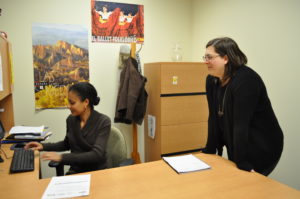SPAN 305/306/309: La Vida es Más Completa
Bringing a language, and a culture, to life was the goal of Spanish language faculty members, Drs. Sonia Balasch, Lisa Rabin, Colleen A. Sweet, and Alexia D. Vikis. They sought to change the dependence on dry and costly textbooks in the SPAN 305-306-309 course stream and to implement a new online curriculum — allowing students to more authentically engage with the rich cultures and histories of the Spanish-speaking world. Because these courses are introductory to the advanced course of study in Spanish, the professors also hoped to craft lessons that would encourage students’ familiarity with disciplinary knowledge in linguistics, cultural studies and literary studies that they could carry into higher-level classes.
Their 4-VA grant provided them the means to achieve their goal.
“We began this effort by searching for OER materials already available,” says Vikis. “But what we found was that there was a scarcity of OER entirely in Spanish or at the college level, so we had to start creating our own.”
Consequently, Vikis and Sweet set about developing lesson plans that included an  introductory reading, buttressed by vocabulary lists, student-centered activities, and multi-media related support materials. Sweet explains, “Not only did we have to write the materials, we also wanted the readings and the lessons to advance in difficulty as the semester progressed.”
introductory reading, buttressed by vocabulary lists, student-centered activities, and multi-media related support materials. Sweet explains, “Not only did we have to write the materials, we also wanted the readings and the lessons to advance in difficulty as the semester progressed.”
Faculty member Sonia Balasch (who has since moved on from Mason) created the readings of the first five lessons integral to SPAN 305. Sweet and Vikis then paired each reading with complementary and post-reading activities in vocabulary enrichment, critical thinking, and engage in appealing group discussions. Lisa Rabin joined in the project and created four chapters for SPAN 306 for which and Sweet and Vikis also developed supplementary materials.
Sweet and Vikis were especially pleased to be able to frame each of the language lessons with contextual material. In one lesson, for example, the students are encouraged to research popular music as a means of social protest in Argentina and Venezuela. This approach gives the class the opportunity to delve more deeply into how music is used as a form of resistance and how technology and social changes influence the way music is shared. Each student is then asked to research a song in a specific Spanish-speaking region and make a presentation on its content, form, social context and reception, to the class.
Sweet and Vikis are currently introducing these new materials to both their students and colleagues in Spanish and Latin American Studies at the University via Blackboard. The four professors have also given talks on the project at the University of Texas Open Education Week webinar and the 2017 Innovations in Teaching and Learning Conference at Mason.
Vikis concludes, “This course redesign provides our students with a deeper exposure to the Spanish-speaking world. It also allows them to more closely identify with the experiences of people in regions different from their own. We are particularly proud of these results in today’s globalized times.”
